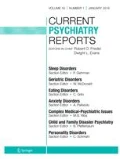Abstract
Psychogenic polydipsia (PPD), a clinical disorder characterized by polyuria and polydipsia, is a common occurrence in inpatients with psychiatric disorders. The underlying pathophysiology of this syndrome is unclear, and multiple factors have been implicated, including a hypothalamic defect and adverse medication effects. Hyponatremia in PPD can progress to water intoxication and is characterized by symptoms of confusion, lethargy, and psychosis, and seizures or death. Evaluation of psychiatric patients with polydipsia warrants a comprehensive evaluation for other medical causes of polydipsia, polyuria, hyponatremia, and the syndrome of inappropriate secretion of antidiuretic hormone. The management strategy in psychiatric patients should include fluid restriction and behavioral and pharmacologic modalities.
Similar content being viewed by others
References and Recommended Reading
Kruse D, Pantelis C, Rudd R, et al.: Treatment of psychogenic polydipsia: comparison of risperidone and olanzapine, and the effects of an adjunctive angiotensin-II receptor blocking drug (irbesartan). Aust N Z J Psychiatry 2001, 35:65–68.
Verghese C, de Leon J, Josiassen RC: Problems and progress in the diagnosis and treatment of polydipsia and hyponatremia. Schizophr Bull 1996, 22:455–464.
de Leon J: Polydipsia—a study in a long-term psychiatric unit. Eur Arch Psychiatry Clin Neurosci 2003, 253:37–39.
Illowsky BP, Kirch DG: Polydipsia and hyponatremia in psychiatric patients. Am J Psychiatry 1988, 145:675–683.
Hariprasad MK, Eisinger RP, Nadler RM, et al.: Hyponatremia in psychogenic polydipsia. Arch Intern Med 1980, 140:1639–1642.
Gillum DM, Linas SL: Water intoxication in a psychotic patient with normal water excretion. Am J Med 1984, 77:773–774.
Jose CJ, Perez-Cruet J: Incidence and morbidity of self-induced water intoxication in state mental hospital patients. Am J Psychiatry 1979, 136:221–222.
Klonoff DC, Jurow AH: Acute water intoxication as a complication of urine drug testing in the workplace. JAMA 1991, 265:84–85.
Fricchione G, Kelleher S, Ayyala M: Coexisting central diabetes insipidus and psychogenic polydipsia. J Clin Psychiatry 1987, 48:75–76.
Stuart CA, Neelon FA, Lebovitz HE: Disordered control of thirst in hypothalamic-pituitary sarcoidosis. N Engl J Med 1980, 303:1078–1082.
Thompson CJ, Edwards CR, Baylis PH: Osmotic and nonosmotic regulation of thirst and vasopressin secretion in patients with compulsive water drinking. Clin Endocrinol (Oxf) 1991, 35:221–228.
Thompson CJ, Selby P, Baylis PH: Reproducibility of osmotic and nonosmotic tests of vasopressin secretion in men. Am J Physiol 1991, 260:R533–R539.
Rao KJ, Miller M, Moses A: Water intoxication and thioridazine (Mellaril). Ann Intern Med 1975, 82:61.
Fraser CL, Arieff AI: Epidemiology, pathophysiology, and management of hyponatremic encephalopathy. Am J Med 1997, 102:67–77.
Douglas I: Hyponatremia: why it matters, how it presents, how we can manage it. Cleve Clin J Med 2006, 73(Suppl 3):S4–S12.
Tomiyama J, Kametani H, Kumagai Y, et al.: Water intoxication and rhabdomyolysis. Jpn J Med 1990, 29:52–55.
Wicki J, Rutschmann OT, Burri H, et al.: Rhabdomyolysis after correction of hyponatremia due to psychogenic polydipsia possibly complicated by clozapine. Ann Pharmacother 1998, 32:892–895.
Twardowschy CA, Bertolucci CB, Gracia Cde M, Brandao MA: Severe hyponatremia and the syndrome of inappropriate secretion of antidiuretic hormone (SIADH) associated with fluoxetine: case report [in Portuguese]. Arq Neuropsiquiatr 2006, 64:142–145.
Sachdeo RC, Wasserstein A, Mesenbrink PJ, D’souza J: Effects of oxcarbazepine on sodium concentration and water handling. Ann Neurol 2002, 51:613–620.
Flegel KM, Cole CH: Inappropriate antidiuresis during carbamazepine treatment. Ann Intern Med 1977, 87:722–723.
Spital A: Diuretic-induced hyponatremia. Am J Nephrol 1999, 19:447–452.
Wilkins B: Cerebral oedema after MDMA (“ecstasy”) and unrestricted water intake. Hyponatremia must be treated with low water input. BMJ 1996, 313:689–690.
Holden R, Jackson MA: Near-fatal hyponatraemic coma due to vasopression over-secretion after “ecstasy” (3,4-MDMA) [letter]. Lancet 1996, 347:1052.
Thaler SM, Teitelbaum I, Berl T: “Beer potomania” in non-beer drinkers: effect of low dietary solute intake. Am J Kidney Dis 1998, 31:1028–1031.
Rose BD, Post TW, Narins R: Hyperosmolal states—hyponatremia and hyperosmolal states—hyperglycemia. In Clinical Physiology of Acid-Base and Electrolyte Disorders, edn 5. New York: McGraw-Hill; 2001:748–757, 767–772.
Tierney LM, Jr, McPhee SJ, Papadakis MA: Fluid and electrolyte disorders and endocrinology. In Current Medical Diagnosis and Treatment, edn 42. New York: McGraw-Hill; 2003:840–845, 1076–1077.
Goldman MB, Robertson GL, Luchins DJ, Hedeker D: The influence of polydipsia on water excretion in hyponatremic, polydipsic, schizophrenic patients. J Clin Endocrinol Metab 1996, 81:1465–1470.
Zerbe RL, Robertson GL: A comparison of plasma vasopressin measurements with a standard indirect test in the differential diagnosis of polyuria. N Engl J Med 1981, 305:1539–1546.
Costanzo ES, Antes LM, Christensen AJ: Behavioral and medical treatment of chronic polydipsia in a patient with schizophrenia and diabetes insipidus. Psychosom Med 2004, 66:283–286.
Moses AM, Clayton B: Impairment of osmotically stimulated AVP release in patients with primary polydipsia. Am J Physiol 1993, 265:R1247–R1252.
Neurology resident web page, medicine pocketbook kidney section. University of Western Ontario Clinical Neurosciences website. Available at: www.uwo.ca/cns/resident/pocketbook/medicine/kidney/hyponatremia.html. Accessed February 28, 2007.
Offenstadt G, Das V: Hyponatremia, hypernatremia: a physiological approach. Minerva Anestesiol 2006, 72:353–356.
Veiweg WV, Godleski LS, Graham P, et al.: Abnormal diurnal weight gain among long-term patients with schizophrenic disorders. Schizophr Res 1988, 1:67–71.
Bowen L, Glynn SM, Marshall BD, Jr, et al.: Successful behavioral treatment of polydipsia in a schizophrenic patient. J Behav Ther Exp Psychiatry 1990, 21:53–61.
Leadbetter RA, Shutty MS, Jr: Differential effects of neuroleptic and clozapine on polydipsia and intermittent hyponatremia. J Clin Psychiatry 1994, 55(Suppl B):110–113.
Lee HS, Kwon KY, Alphs LD, Meltzer HY: Effect of clozapine on psychogenic polydipsia in chronic schizophrenia [letter]. J Clin Psychopharmacol 1991, 11:222–223.
Alexander RC, Karp BI, Thompson S, et al.: A double blind, placebo-controlled trial of demeclocycline treatment of polydipsia-hyponatremia in chronically psychotic patients. Biol Psychiatry 1991, 30:417–420.
Greendyke RM, Bernhardt AJ, Tasbas HE, Lewandowski KS: Polydipsia in chronic psychiatric patients: therapeutic trials of clonidine and enalapril. Neuropsychopharmacology 1998, 18:272–281.
Sebastian CS, Bernardin AS: Comparison of enalapril and captopril in the management of self-induced water intoxication. Biol Psychiatry 1990, 27:787–790.
Author information
Authors and Affiliations
Corresponding author
Rights and permissions
About this article
Cite this article
Dundas, B., Harris, M. & Narasimhan, M. Psychogenic polydipsia review: Etiology, differential, and treatment. Curr Psychiatry Rep 9, 236–241 (2007). https://doi.org/10.1007/s11920-007-0025-7
Published:
Issue Date:
DOI: https://doi.org/10.1007/s11920-007-0025-7




